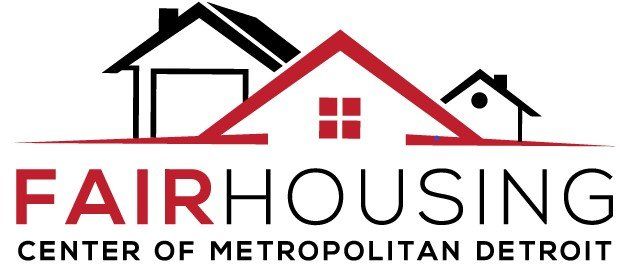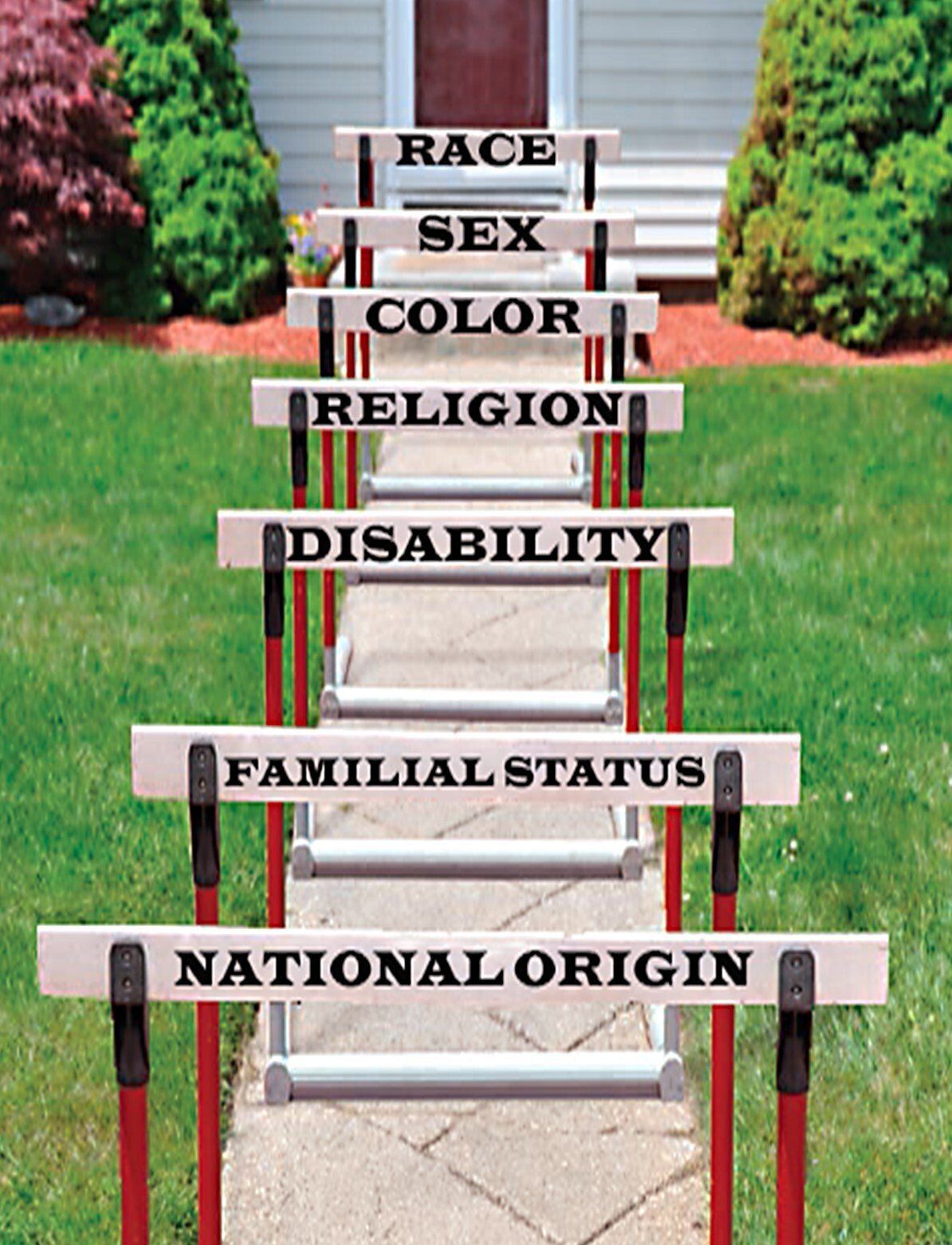What is Fair Housing?
Fair housing is the right to choose housing or to obtain a loan or insurance free from unlawful discrimination. Unlawful discrimination is treating someone or a group of people in an unfair or adverse fashion because of their race, ethnicity or other protected class status.
What are the protected class categories?
The main federal law that prohibits housing discrimination is the Fair Housing Act (FHA). The FHA lists 7 protected classes: race, color, national origin, religion, sex, disability, and familial status.
It is unlawful under the FHA to discriminate against any person due to their membership in a protected class. In other words, there should be no hurdle or obstacle to housing opportunities because of a person's protected class membership.
The Michigan Elliot-Larsen Civil Rights Act (ELCRA) and the Michigan Persons with Disabilities Civil Rights Act (PWDCRA) the include 11 protected class categories: the same 7 protected class categories as the FHA (race, color, national origin, religion, sex, familial status, and disability) and 4 additional categories (age, marital status, sexual orientation, and gender identity or expression).
Some local ordinances include additional protected class categories. For example, the City of Detroit’s fair housing ordinance, in addition to all of the categories listed above, includes public benefit status, height, and weight.
What kind of housing is covered?
Almost all kinds of residential housing are covered, including private housing, public housing, and housing that receives federal funding. These types of housing include single and multi-family homes, apartment buildings, condominiums, cooperative units, homeless shelters, nursing homes, school dormitories, rehabilitative group homes, mobile home parks, timeshare properties, and other places where people live for an extended period of time.
Temporary housing, such as hotels, motels, hospitals, bed and breakfast facilities, are covered under laws that prohibit discrimination in places of public accommodation. Our office receives complaints and investigates claims of discrimination in places of public accommodation.
Who can bring a fair housing claim?
Anyone can bring a fair housing claim. Successful fair housing claims have been filed by one or more individuals, neighbors, corporations and partnerships, real estate agents and brokers, membership organizations such as the NAACP, HUD, state and local agencies, and housing developers.
Who Can Bring A Fair Housing Claim?
Anyone can bring a fair housing claim. Successful fair housing claims have been filed by one or more individuals, neighbors, corporations and partnerships, real estate agents and brokers, membership organizations such as the NAACP, HUD, state and local agencies, and housing developers.
What kinds of actions are prohibited?
It is illegal to engage in any of the following actions because of race, color, religion, sex, disability, familial status, national origin or other protected class categories:
- SALE OR RENTAL OF HOUSING
- Refusal to rent or sell housing
- Refusal to negotiate for housing
- Otherwise making housing unavailable
- Falsely representing that housing is unavailable for inspection, sale, or rental
- Setting different terms or conditions for sale or rental
- Imposing different sales prices or rental charges
- Using different qualification criteria or applications, or sale or rental standards or procedures, such as income standards, application requirements, application fees, credit analyses, sale or rental approval procedures or other requirements
- Making, printing, or publishing any oral or written statement, notice or advertisement that indicates any preference, limitation, exclusion, or discrimination
- Discouraging the purchase or rental of a dwelling
- Limiting privileges, services, or facilities of a dwelling
- Evicting a tenant or a tenant’s guest
- Harassing a person
- Failing or delaying performance of maintenance or repairs
- Assigning a person to a particular building or neighborhood or section of a building or neighborhood
- For profit, to persuade, or try to persuade, homeowners to sell their homes by suggesting that people of a particular protected class are about to move into the neighborhood (blockbusting)
- Refusing to provide renter or homeowner insurance due to the protected class of the owner and/or occupants of a dwelling
- Denying access to or membership in any real estate brokers’ organization or multiple listing service
- MORTGAGE LENDING
- Refusing to make a mortgage loan or provide financial assistance
- Refusing to provide information regarding loans
- Imposing different terms or conditions on a loan, such as different interest rates, points, or fees
- Discriminating in the appraisal of a dwelling
- Conditioning the availability of a loan on a person’s response to harassment
- Refusal to purchase a loan
- RETALIATION
- Threatening, coercing, intimidating, or interfering with anyone exercising a fair housing right or assisting others who exercise the right
- Retaliating against a person who has filed a fair housing complaint or assisted in a fair housing investigation
- PROTECTIONS FOR PERSONS WITH DISABILITIES
- Refusing to grant reasonable accommodations or permit reasonable modifications that are necessary to allow persons with disabilities to fully use and enjoy their housing
- Design and construction requirements for certain multifamily housing units must include accessible public and common use areas; doors that are wide enough to allow passage by people using wheelchairs; accessible routes into and through the units; accessible light switches, electrical outlets, and thermostats; reinforcements in bathroom walls for grab bars; and usable kitchens and bathroom.
Why Is Fair Housing So Important to Our Community?
Fair housing guarantees that all persons, regardless of their background, family situation, sex, ethnicity, or other factors, have the right to choose housing that best serve their needs—free from prejudices and stereotypes. Fair housing opens doors of housing opportunity, resulting in diverse and vibrant communities.
Fair housing also enhances neighborhood stability, leading to economic development. People who feel welcome in a neighborhood are more likely to make it a permanent home and, in turn, invest resources back into the community.
What Should You Do If You Suspect A Fair Housing Violation?
Report it.
Why is fair housing so important to our community?
Fair housing guarantees that all persons, regardless of their background, family situation, sex, ethnicity, or other factors, have the right to choose housing that best serve their needs—free from prejudices and stereotypes. Fair housing opens doors of housing opportunity, resulting in diverse and vibrant communities.
Fair housing also enhances neighborhood stability, leading to economic development. People who feel welcome in a neighborhood are more likely to make it a permanent home and, in turn, invest resources back into the community.
What should you do if you suspect a fair housing violation?
Learn more about fair housing in the Metropolitan Detroit area.
Call us at (313) 579-FAIR (3247) today.
Contact Information
Address: 5555 Conner St., Suite 2244 Detroit, MI 48213-3487
Phone: (313) 579-FAIR
Fax: (313) 963-4817
Email: info@fairhousingdetroit.org
Business Hours
- Mon - Thu
- -
- Friday
- -
- Sat - Sun
- Closed
Our Location
Contact Information
Address: 5555 Conner St., Suite 2244, Detroit, MI 48213-3487
Phone: 313-579-FAIR
Fax: 313-963-4817
Email: info@fairhousingdetroit.org
Business Hours
- Mon - Thu
- -
- Friday
- -
- Sat - Sun
- Closed
Our Location
Contact Information
Address: 5555 Conner, Suite 2244, Detroit, MI 48213-3487
Phone: 313-579-FAIR
Fax: 313-963-4817
Email: info@fairhousingdetroit.org
Business Hours
- Mon - Thu
- -
- Friday
- -
- Sat - Sun
- Closed

